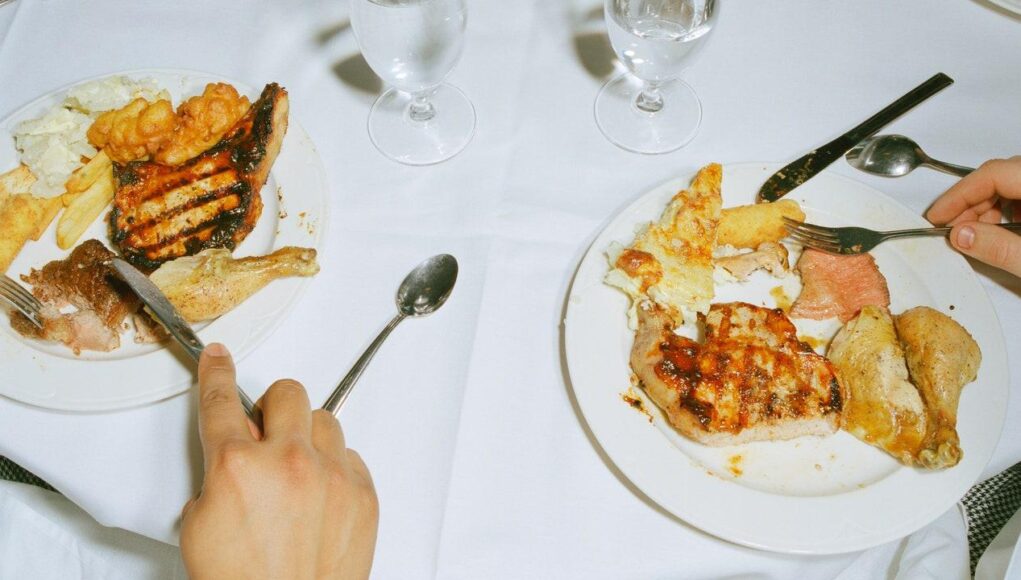Dinners have always caused me dilemmas. Long before the high protein hype. It’s the time of day when I am most hungry, when I am most tired, and when I’m conscious that having a big dinner will impact my sleep. I’m also on a weight loss journey, and the metabolism slows down at night when you’re less awake and active, burning fewer calories. I’ve tried a few strategies, but so far, undoubtedly, the one that is working best for me is to focus solely on protein for dinner.
The current fixation for protein is real: So real, in fact, that according to nutritionist Melyssa Chang, we’ve gone from not eating enough to, in some cases, overeating protein, estimating at around 35 per cent too much of the stuff. On my dietary journey for this article, I wanted to make sure I wasn’t championing protein to the point of demonizing other nutrients. Whether you’ve consciously upped your protein intake or not, it should not be done to the detriment of other necessary macronutrients, like fats and slow-absorption carbohydrates.
So, I have been having protein-only dinners four times a week, then, paying special attention to my vegetable, fat, and carbohydrate intake in my other meals throughout the day, so as not to unbalance the rest of the diet and lose other vital nutrients. Having said all this, here’s how I do it.
Protein intake and weight loss
Nutritionist and biochemist Leticia Carrera advised me that if you want to lose weight, focusing on protein in the evening will keep you satisfied and satiated. “At night, the caloric expenditure is minimal, so everything we eat for dinner that the body does not use will be stored as fat,” Carrera says. “I recommend having protein for dinner if you want to lose weight, because protein is necessary to form new tissues. At night, our body goes into repair mode. When we eat protein we burn a lot of energy to metabolize it, so the total calories it provides us with are reduced.”
To caveat all of this, I do not weigh myself at home—the number on the scales is going to fluctuate throughout the day, from water weight to sodium levels, nor is it taking in the different between fat and muscle mass. Besides, as the nutritionist María del Mar Silva previously told Vogue, “the correct weight loss is when we do not lose muscle mass. And that cannot be reliably detected with the scales we have at home.”
Itziar Digón, a psychologist who specializes in mindful eating says it is important not to watch the scale, but to pay attention to body sensations. Observe if you feel lighter, or to see how the clothes you wear usually fit—celebrity trainer Amy Rossof David also calls it the “jeans test.” After a few months of protein-only dinners, I did notice a difference in the feeling of my waist in pants.
The protein leverage theory
Proteins are satiating—one of my favorite dinners has become a French omelette and grilled shrimp, followed by kefir for dessert. It’s what has kept me most satisfied and full going to bed, plus, it’s super easy to make.
In her book Lose Fat, Gain Life, Dr. Laura Bartolomé breaks down the “protein leverage theory.”
“One of the determinants of our appetite is our body’s need to reach a minimum amount of protein intake,” she writes, “and until we are satisfied, our appetite mechanisms will be active, and those that signal satiety will be inhibited.” Essentially, people tend to eat more food—especially foods high in carbohydrates and fats—to meet their daily protein needs when protein intake is lesser or diluted in their diets. Focusing on protein had me reaching less for breads or sugary snacks to make me feel more full.
“The positive thing about eating protein dinners is that they generate more satiety and that helps you eat less at night,” nutritionist Laura Parada explains. “And if we opt for easily digestible protein options such as eggs, white fish, or low fat cheeses if you aren’t lactose intolerant, even better. We will feel lighter, enjoy better sleep, and feel satiated.”
How to balance the rest of your diet with protein-only dinners
When I told Parada about my experiment in protein-only dinners on weekdays, she had some thoughts. “Eating a protein-only dinner can be an alternative for body fat reduction and weight loss diets, but it must be done in a balanced way to compensate for the nutrients that are not consumed in that dinner,” she says. “In the rest of the meals of the day—breakfast and lunch—it is necessary to include the adequate amount of carbohydrates, which provide vitamins, minerals and fiber, as well as food sources of animal and vegetable fats that provide monounsaturated and polyunsaturated fatty acids. Consuming only protein at dinner does not ensure that we lose fat if the rest of the meals are not adequate to our caloric requirement.”
“A dinner composed of protein alone is nutritionally incomplete, therefore, it is essential to make sure that the rest of the meals include the necessary amount of fruits, vegetables, healthy fats and carbohydrates. The important thing is the total count,” adds Laura Jorge.
So how do I navigate the nutrient alchemy in my other meals? For breakfast, I opt for a piece of wholegrain toast with tomato or avocado and some fruit. My lunch always includes a good portion of vegetables and carbohydrates, and between meals, I might pick up a snack like fruit and nuts, a combination that provides necessary minerals and healthy fats.
And what do I do for these protein-only dinners? There are many possibilities, but I have a few failsafe and favorites. There’s a quiche with turkey, ricotta cheese, egg, and mozzarella, and sometimes I’ll have grilled eggs with shrimp. I’ll pair chicken or turkey breast with baked shrimp, make a tuna or salmon tartar with tabasco sauce, a shrimp omelette, or beef with parmesan cheese slices.







